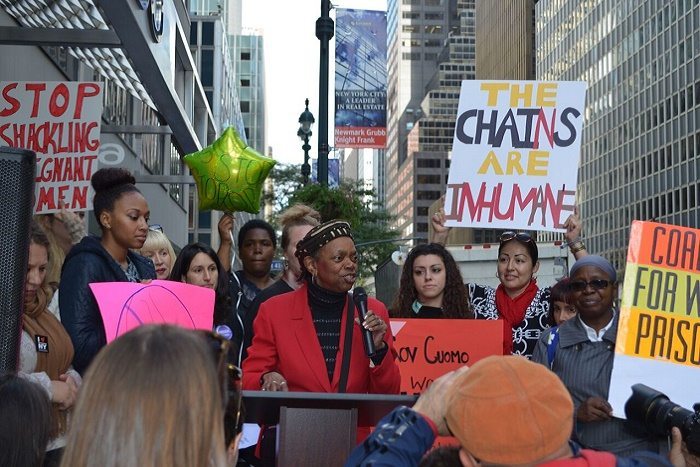Shackling of Pregnant Prisoners Could Soon End in New York
Shackling, which can include placing handcuffs, waist chains, and leg irons on a pregnant woman, has been widely denounced by the medical community.

A bill that would end the practice of shackling incarcerated pregnant women in New York is making its way to the governor’s desk, after receiving overwhelming support in the state assembly and senate.
On Monday, in a rally organized by the Correctional Association of New York, activists, politicians, and formerly incarcerated women converged in front of Gov. Andrew Cuomo’s office in midtown Manhattan to urge the Democratic governor to sign the bill.
The movement to end shackling is hardly new. New York in 2009 passed a law banning the use of shackles on incarcerated women during labor, delivery, and recovery. Shackling, which can include placing handcuffs, waist chains, and leg irons on a pregnant woman, has been widely denounced by the medical community: the American Congress of Obstetricians and Gynecologists has called the practice “demeaning and unnecessary”; the American Medical Association simply calls it “barbaric.”
But since 2009, there have been widespread violations of the ban across New York. Out of 27 women who gave birth while in state corrections custody in the five years after the ban was passed, 23 were shackled in violation of the law, according to a report released this year by the Correctional Association.
The shackling of pregnant women in prison is legal in 28 states.
The 2015 Anti-Shackling Bill expands the protections granted in the 2009 law, extending the ban on shackling to include the entire pregnancy as well as an eight-week postpartum period. The measure requires corrections officials to report any instances of shackling to the governor and state legislature each year.
It also prohibits correctional staff from being in the delivery room during birth, a practice that pregnant women have described as humiliating and traumatic.
There are about 4,000 women in New York state prisons and about 31,000 women in local corrections custody over the course of a year, according to the Correctional Association. Poor women and women of color are vastly over-represented in these numbers.
Crystal Degnitz, who gave birth to her daughter in 2014 while incarcerated at the Bedford Hills Correctional Facility in New York, described her experiences with shackling as “awful” during a phone interview with Rewire. She was required to go to the doctor every day during her pregnancy, and for two months after. Degnitz says she was often shackled, with corrections officers attaching leg irons to her even when she was in the third trimester of her pregnancy.
Degnitz recalled a particularly painful trip after she gave birth, when she was transported with her newborn daughter to a pediatrician outside the prison.
“They kept us completely shackled: belly chains, black box, and leg irons, in wheelchairs, with an infant car seat on our laps,” Dengitz recalled. “When the babies had to eat, they still left everything on us, and kind of just put the baby up on our chest, and had us try to maneuver the bottle into their mouth.”
Supported by a wide range of medical and advocacy groups, from the American College of Nurse-Midwives to the Prison Policy Initiative, the bill has drawn opposition from the New York State Sheriffs’ Association, which has called the bill an “unfunded mandate” and criticized it for threatening public safety.
“There is nothing about a pregnant female—two months, or three months or six months pregnant—that makes her less dangerous than someone who is not pregnant,” Peter Kehoe, the director of the Sherriffs Association, told the Daily Star in July.
Local and state correctional facilities typically send two officers, one or both of whom are armed, to guard an incarcerated pregnant person when she is taken off prison or jail grounds, according to the Correctional Association.
“The experiences that Crystal talked about are echoed around the state, and unfortunately around the country,” Tamar Kraft-Stolar, director of the Women in Prison Project at the Correctional Association, told Rewire. “The fight for this bill is a fight to protect the basic health and human rights of incarcerated women.”
